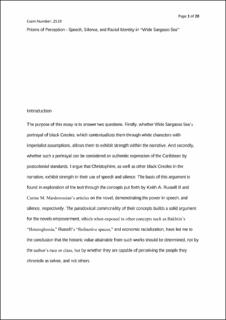| dc.contributor.advisor | Jones, Allen Clarence | |
| dc.contributor.author | Maman, Erlend Soumana | |
| dc.date.accessioned | 2022-07-13T15:51:22Z | |
| dc.date.available | 2022-07-13T15:51:22Z | |
| dc.date.issued | 2022 | |
| dc.identifier | no.uis:inspera:110340637:21580993 | |
| dc.identifier.uri | https://hdl.handle.net/11250/3005120 | |
| dc.description.abstract | In this essay I aim to answer two questions. Firstly, whether Wide Sargasso Sea’s
portrayal of black Creoles allows them to exhibit strength within the narrative. And secondly,
its portrayal can be considered an authentic expression of the Caribbean by
postcolonial standards. I argue that Christophine, as well as other black Creoles in the
narrative, exhibit strength in their use of speech and silence. The foundation of this argument is
found in exploration of the text through analysis by Keith A. Russell and
Carine M. Mardorossian’s articles on the novel, demonstrating the power in speech, and
silence, respectively. The paradoxical commonality of their concepts builds a solid argument
for the novels empowerment, which when fused with other concepts such as Bakhtin’s
“Heteroglossia,” Russell’s “Refractive spaces,” and economic racialization, have brought me to
the conclusion that the historic value attainable from such works should be determined, not by
the author’s race or class, but by whether they are capable of perceiving the people they
chronicle as selves, and not others. | |
| dc.description.abstract | In this essay I aim to answer two questions. Firstly, whether Wide Sargasso Sea’s
portrayal of black Creoles allows them to exhibit strength within the narrative. And secondly,
its portrayal can be considered an authentic expression of the Caribbean by
postcolonial standards. I argue that Christophine, as well as other black Creoles in the
narrative, exhibit strength in their use of speech and silence. The foundation of this argument is
found in exploration of the text through analysis by Keith A. Russell and
Carine M. Mardorossian’s articles on the novel, demonstrating the power in speech, and
silence, respectively. The paradoxical commonality of their concepts builds a solid argument
for the novels empowerment, which when fused with other concepts such as Bakhtin’s
“Heteroglossia,” Russell’s “Refractive spaces,” and economic racialization, have brought me to
the conclusion that the historic value attainable from such works should be determined, not by
the author’s race or class, but by whether they are capable of perceiving the people they
chronicle as selves, and not others. | |
| dc.language | eng | |
| dc.publisher | uis | |
| dc.title | Prisms of Perception - Speech, Silence, and Racial Identity in “Wide Sargasso Sea” | |
| dc.type | Bachelor thesis | |
